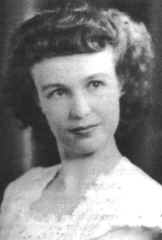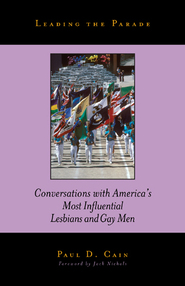Difference between revisions of "Lisa Ben"
| Line 3: | Line 3: | ||
{{Infobox Biography | {{Infobox Biography | ||
|name=Lisa Ben | |name=Lisa Ben | ||
| − | |image= | + | |image=Lisa ben.jpg |
| − | |caption= | + | |caption=Young Lisa Ben <ref>http://andrejkoymasky.com/liv/fam/biob3/ben1.jpg</ref> |
|born= | |born= | ||
|died= | |died= | ||
|role=Author/Editor}} | |role=Author/Editor}} | ||
| − | [[Image:Leading.jpg|frame|right|Order from [http://www.amazon.com/exec/obidos/ASIN/0810859130/oneinstitutinter Amazon.com]]]The following interview with Lisa Ben was conducted by | + | [[Image:Leading.jpg|frame|right|Order from [http://www.amazon.com/exec/obidos/ASIN/0810859130/oneinstitutinter Amazon.com]]]The following interview with Lisa Ben was conducted by Paul D. Cain on April 15, 1995. We continue to use her pseudonym by her request. |
Revision as of 19:30, 14 October 2008
Author of Vice Versa: America’s Gayest Magazine (1947)
 Young Lisa Ben [1] | |
| Born | |
|---|---|
| Died: | |
| Role: | Author/Editor |

The following interview with Lisa Ben was conducted by Paul D. Cain on April 15, 1995. We continue to use her pseudonym by her request.
Cain’s chapter on Ben can be found in Amazon.com Leading the Parade: Conversations with America’s Most Influential Lesbian and Gay Men, published by Scarecrow Press in 2002. A paperback version was released in May of 2007. A chapter on Ben can also be found in Vern L. Bullough’s Before Stonewall: Activists for Gay and Lesbina Rights in Historic Contexts.
Coming of Age
Paul:
- Where in northern California did you grow up?
Lisa:
- I never did grow up. [Laughs]
Paul:
- All right… Where did you spend your childhood years?
Lisa:
- My childhood years were in Los Altos, California.
- My parents owned a 33-acre fruit ranch and, when I was three years old, they moved from San Francisco to this fruit ranch in Los Altos. So I spent my childhood years from age three to 21 at the ranch. So I grew up with lots of animals. Not very many friends, but lots of animals. We had a nanny goat, and I had my own riding pony, lots of chickens and ducks, and there were turkeys. And I think at one time Mother even had some guinea hens, and mallard ducks, and of course lots and lots of different kinds of fruit, except the kind of fruit that I would have enjoyed associating with.
Paul:
- The forbidden fruit. [Laughs]
Lisa:
- Yeah. We had apricots mainly — pears, peaches, quince, figs, almonds, walnuts, plums. And we even had an olive tree, and Mother would pick the olives and pickle ’em in brine and fix black olives, and Mother did an awful lot of canning. So we had lots of nice home-canned fruit, things like that. It was a real country life, which was nice — I’m glad, in retrospect, that I grew up there rather than growing up in San Francisco or San Jose or some other place, you know.
Paul:
- But you spent most of the rest of your life since then in larger cities, right?
Lisa:
- Well, just — first, I — they got rid of me, and I lived in Palo Alto for 2-1/2 years. And then from there I moved down to L. A. because I wanted to kind of get away from them. Not that — it wasn't because of gay life, it was a… Well, anyway, that's another whole different story, and I don't think maybe you'd want to include that in your book. But, suffice it to say, it was sort of a fight over power. They wanted to keep me at home and rent me out as an office girl, and then take a third of my salary in gratitude.
Paul:
- Well, that was one of things that I had read was that you had spent two years in college, then your parents kind of forced you to go into business school, and that you always hated office work.
Lisa:
- That's true; I did. I hated it with a passion.
Paul:
- And I guess what I wonder is: being such an adventurous spirit, if you hated to do it so much, why did you continue to do it for the rest of your life?
Lisa:
- I wasn't an adventurous spirit! I was very cowed, very passive. I didn’t do anything — I mean, if I spoke back to my mother, she’d slap me across the face so hard! My dad never raised a hand to me, but he could make feel about two inches high with his putdowns. So I was — and I was the only child.
Paul:
- Ah! OK.
Lisa:
- So I was very, very much — I would have stayed with them if they hadn’t said, “Well, because of the war, we’ve decided that you might be safer in Palo Alto because there’s going to be a food shortage.” Well, I believed them. And this wasn’t true at all. I didn’t want to cooperate with them in contributing my salary to them because I hated the work so much, and my dad got angry and quit my music lessons because of that, which was terrible. I had always supposed I would be playing in a symphony orchestra.
Paul:
- What did you play?
Lisa:
- Violin. And I worked hard at that violin.
- And when he did that, he lost all my love for him. I didn’t have much love for him in the first place, but, you know, that did it. So when they said we think you should move to Palo Alto, I thought, aha! At least there I can read the books I want to read from the library, and go to a mystery movie once in a while if I want to. They frowned on mystery movies, and you’d think that the books I brought home from the library were pornographic, the way they reacted. I would bring home a mystery story or a ghost story or something, and I liked to read it for fun — it didn’t affect me with nightmares, or anything. And Mother at the dinner table would say, “Show Daddy what kind of book you brought home from the library today.” And here I was 18 or 19 years old! You know, I mean —
Paul:
- Goodness, yes — I can understand.
Lisa:
- It wasn't as though I were 5 or 6 years old.
Paul:
- Was there any kind of a religious background, or anything?
Lisa:
- No — Mother used to force me to go to church — Daddy never went to church. But I didn’t want to go to church because — I mean, for that reason. I told Mother, “Well, I like the devil.”
Paul:
- Oh, gosh! [Laughs]
Lisa:
- Because, you know, it was the opposite, and she was horrified. [Laughs] Of course, there were no cults around, or anything like that, but I just took the opposite tack. Well, when I got a chance to move to Palo Alto, at their suggestion, I said, “Oh!,” and I just shrugged my shoulders, and then, “If that’s what you want —” Well, Mother drove me over there and got me a room to live in. And they were so careful about what I read, or what I saw in the movies, that I was just astonished they would do this. And they thought nothing of my hopping on the bicycle in my little shorts and halter, riding around the country roads alone, and it was lonely in those places — they never objected to that, nor to my riding my pony alone — but you’d think they would worry about! But they didn't.
Paul:
- Parents are funny that way.
Lisa:
- But reading and movies — oh, my. So, anyway, I just — I think — I remember my father saying, “I think you’ll find that it’s more expensive to live away from home — you should stay here.” And I thought, “That’s why they’re doing this — they're going to expect me to come back, and say please take me back, or ‘Daddy, can I borrow some money?’ or something.” Well, I never borrowed a cent from that person — from the day they put me out to Palo Alto. I starved to death, but I didn't borrow from them — I didn't ask them for anything. And I was permitted to come home for Sunday dinner every Sunday. I could take the bus to Los Altos, and they would drive me back — wasn’t that nice of them?
Paul:
- [Laughs]
Lisa:
- So, being short of money, I used to hitchhike to Los Altos, and that horrified my mother.
Paul:
- Right. I heard about that.
Lisa:
- And I showed up at the ranch house, and she’d say, “How’d you get here?” “Well, I hitchhiked.” They didn’t like that, but they couldn’t forbid it.
- So, anyway, they finally sold the ranch and moved to Menlo Park, close by. And I still lived in my — oh, I finally got a room where I took care of children at night, and I got a free room. Well, they didn't like that very much either. But what could they do? By that time, when I had a free room in someone else’s house, Mother couldn’t come up to the room and look around, or look in my closet and see if I had anything to eat, and all that. So that worked out real fine. And I'd be walking home from work, and I’d see Mother's old blue DeSoto trailing along, and she'd say, “You want a ride home?,” meaning where I lived, and I’d say yes. By that time I was down to 99 pounds — I mean, I was skinny. You wouldn’t believe it now, would you? So she’d take me home, and one day—I’ll never forget this — she said, “Have you had your dinner yet?” And I said no. And she said, “Aren’t you hungry? Wouldn’t you like to take Mother out to dinner?” And I said no, and I expected a slap across the face when I said that, but she didn’t say anything. But what cruel things to say!
Paul:
- Parents can do the wrong thing.
Venturing Forth
Soon to be continued....
Categories
Interview by Paul D. Cain, edited by C. Todd White.
This page Copyright (c) by C. Todd White, 2008. All rights reserved. No portion of this interview can be reprinted without permission. Please contact Dr. White at todd@tangentroup.org to secure permission or to report errors or omissions.